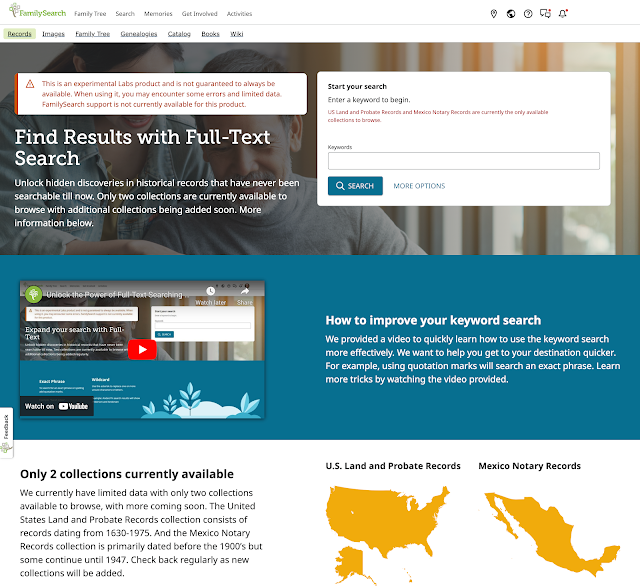https://www.familysearch.org/Labs/
RootsTech 2024 was filled with technology with an emphasis on artificial intelligence or AI. One long anticipated announcement by FamilySearch was the beginning Full-Text.
Full-Text is just what the name implies, the FamilySearch program can now search the full or complete text of historical documents. This opens up the ability to find more exact information. Previously and what is still the case with indexed records, the indexes only find records that matched the somewhat arbitrary index fields. With Full-Text searches, you can search for any possible word that may be in the document or record. Presently, there are only two large FamilySearch databases that are available to search; U.S. Land and Probate Records, a record dating from 1630 to 1975 and Mexico Notary Records, a set of records that is primarily dated before 1900 but with some records up to 1947. More additions are planned.
The records that will become available are those that that have been prepared by sophisticated handwriting recognition software and Optical Character Recognition (OCR) software. So the process is that the original documents are processed by the handwriting recognition and converted into text files and then the Full-Text search program can search every word in the documents for your "Keywords." The keywords can be any text string such as names, dates, and places. The challenge is choosing keywords for search that may be in the documents or records you are searching.
To test the system, I searched using the name of my great-grandfather, Henry Martin Tanner who was born in San Bernardino, Los Angeles, California in 1852 and died in Gilbert, Maricopa, Arizona in 1935. I immediately found the following deed that I had never seen before and was not attached as a FamilySearch Memory.
I would not know to even look for this document much less have found it in unindexed records previously.
These are full text searches and so you have to work with your search terms or keywords to get any specific results.
These new FamilySearch developments give me a lot to write about and additional topics for videos.







No comments:
Post a Comment